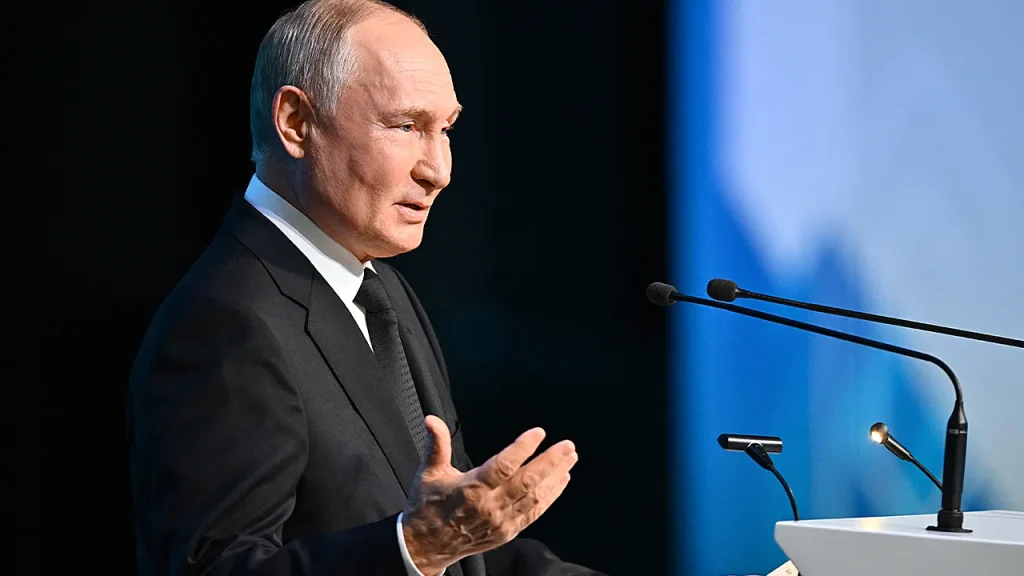Putin Dismisses Health Concerns Despite Avoiding Blood Pressure Test
Vladimir Putin recently sought to quell persistent rumors about his health by assuring attendees at Moscow’s AI Journey forum that he had just completed a thorough annual checkup. “I recently had my annual checkup. It took two and a half days, including an overnight stay at the clinic. Thank God, everything is fine,” the 73-year-old Russian president told the crowd. This statement came after he notably declined to try a new AI-powered kiosk that measures pulse and blood pressure through a fingertip scanner. Surrounded by bodyguards, Putin’s avoidance of the simple health demonstration raised eyebrows among observers already speculating about his condition.
The health of world leaders, particularly those who maintain tight control over information like Putin, often becomes a subject of intense scrutiny and speculation. Just days before the AI forum, at another Moscow event on November 9, attendees noticed what appeared to be a bruised or swollen hand on the Russian president. Ukrainian presidential advisor Anton Gerashchenko even highlighted this observation on social media, posting a close-up photo with the comment that Putin’s “veins are bulging” and suggesting “there’s something wrong with Putin’s hands.” These visible physical changes have fueled ongoing rumors about potential health issues that the Kremlin has consistently denied over the years.
This isn’t the first time Putin’s physical condition has sparked debate. In 2022, video footage of him gripping a table during a meeting with defense officials led to widespread speculation that he might be suffering from Parkinson’s disease or chronic pain. Ukrainian President Volodymyr Zelenskyy added to the speculation earlier this year when he predicted Putin “will die soon,” amid rumors the Russian leader might be battling cancer or recovering from strokes. The Kremlin has always maintained a tightly controlled image of Putin as a vigorous, healthy leader – regularly releasing photos and videos of him engaging in outdoor activities and sports – making any potential signs of weakness particularly noteworthy.
Despite avoiding the blood pressure test, Putin seemed comfortable discussing longevity at the AI forum, expressing his belief that humans might eventually live up to 150 years. “It is probably possible to reach 150,” he said, before adding philosophically, “But it will always be too few, just like with money — always.” This contemplation of extended human lifespan isn’t new territory for Putin. During a summit in Beijing this September, he was caught on a hot mic with Chinese President Xi Jinping and North Korean leader Kim Jong Un, joking about biotechnology and organ transplants, saying, “The longer you live, the younger you become. Perhaps one day, we may even achieve immortality.”
The contrast between Putin’s reluctance to undergo a simple health screening in public while simultaneously discussing extended lifespans highlights the complex nature of his public persona. As one of the world’s most powerful and longest-serving leaders, maintaining an image of perfect health is arguably crucial to his authority. Any admission of weakness or vulnerability could potentially undermine his carefully cultivated strongman image, especially during a time when Russia remains entangled in its ongoing war against Ukraine and faces numerous international challenges.
Health rumors surrounding aging authoritarian leaders often take on additional significance because they relate directly to questions of succession and stability. Unlike democratic systems with clear transition processes, personalized power structures like Putin’s Russia face greater uncertainty when the leader’s health comes into question. While Putin has taken steps to potentially extend his rule until 2036 through constitutional changes, the lack of transparency about his health status and the absence of a clear successor continue to fuel speculation. Whether the recent comments about his medical checkup will quiet rumors or simply add to the ongoing health narrative remains to be seen, but it’s clear that Putin’s physical condition will remain a subject of intense interest both within Russia and internationally for as long as he remains in power.


